中英文课程描述(计算机、自动化)
- 格式:doc
- 大小:150.50 KB
- 文档页数:20
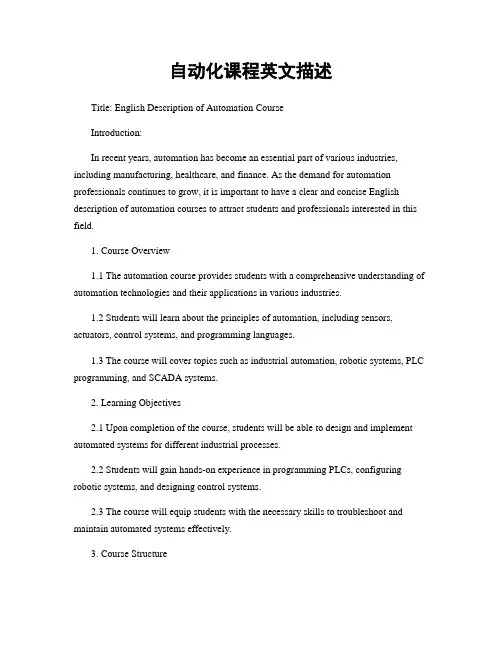
自动化课程英文描述Title: English Description of Automation CourseIntroduction:In recent years, automation has become an essential part of various industries, including manufacturing, healthcare, and finance. As the demand for automation professionals continues to grow, it is important to have a clear and concise English description of automation courses to attract students and professionals interested in this field.1. Course Overview1.1 The automation course provides students with a comprehensive understanding of automation technologies and their applications in various industries.1.2 Students will learn about the principles of automation, including sensors, actuators, control systems, and programming languages.1.3 The course will cover topics such as industrial automation, robotic systems, PLC programming, and SCADA systems.2. Learning Objectives2.1 Upon completion of the course, students will be able to design and implement automated systems for different industrial processes.2.2 Students will gain hands-on experience in programming PLCs, configuring robotic systems, and designing control systems.2.3 The course will equip students with the necessary skills to troubleshoot and maintain automated systems effectively.3. Course Structure3.1 The course consists of lectures, practical lab sessions, and projects to provide a well-rounded learning experience.3.2 Students will have the opportunity to work on real-world automation projects to apply their knowledge and skills.3.3 The course will also include guest lectures from industry experts to provide insights into the latest trends and technologies in the field of automation.4. Prerequisites4.1 Students enrolling in the automation course should have a basic understanding of electrical engineering and programming concepts.4.2 It is recommended for students to have prior knowledge of PLC programming, robotics, and control systems.4.3 Proficiency in English is essential for understanding the course materials and communicating effectively with instructors and peers.5. Career Opportunities5.1 Graduates of the automation course will have a wide range of career opportunities in industries such as manufacturing, automotive, aerospace, and healthcare.5.2 Job roles for automation professionals include automation engineer, control systems engineer, robotics specialist, and PLC programmer.5.3 With the increasing demand for automation experts, graduates can expect competitive salaries and opportunities for career advancement in the field of automation.Conclusion:In conclusion, the English description of the automation course provides a detailed overview of the course content, learning objectives, structure, prerequisites, and career opportunities for students and professionals interested in pursuing a career in automation.By enrolling in the automation course, students can acquire the necessary skills and knowledge to excel in the rapidly growing field of automation.。
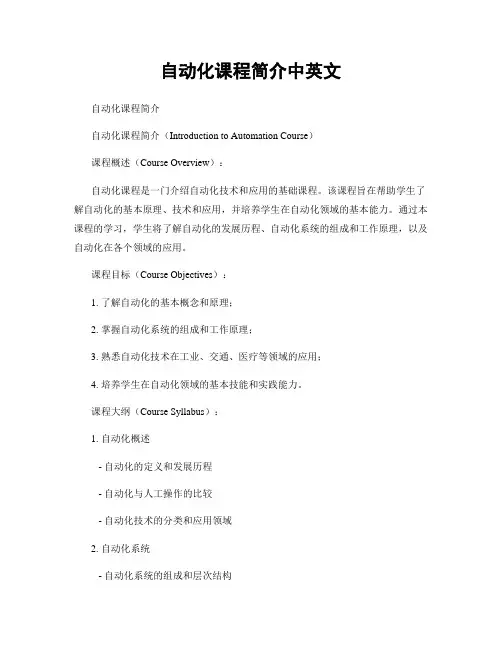
自动化课程简介中英文自动化课程简介自动化课程简介(Introduction to Automation Course)课程概述(Course Overview):自动化课程是一门介绍自动化技术和应用的基础课程。
该课程旨在帮助学生了解自动化的基本原理、技术和应用,并培养学生在自动化领域的基本能力。
通过本课程的学习,学生将了解自动化的发展历程、自动化系统的组成和工作原理,以及自动化在各个领域的应用。
课程目标(Course Objectives):1. 了解自动化的基本概念和原理;2. 掌握自动化系统的组成和工作原理;3. 熟悉自动化技术在工业、交通、医疗等领域的应用;4. 培养学生在自动化领域的基本技能和实践能力。
课程大纲(Course Syllabus):1. 自动化概述- 自动化的定义和发展历程- 自动化与人工操作的比较- 自动化技术的分类和应用领域2. 自动化系统- 自动化系统的组成和层次结构- 传感器和执行器的原理和应用- 控制器和执行器的选择和配置3. 控制理论基础- 反馈控制原理- 控制系统的稳定性和性能指标- PID控制器的原理和调节方法4. 自动化技术应用- 工业自动化技术- 交通自动化技术- 医疗自动化技术- 农业自动化技术5. 自动化实验- 自动化系统的建模和仿真- 控制器的设计和调试- 自动化系统的性能评估和优化教学方法(Teaching Methods):1. 授课:教师通过讲解理论知识和实际案例,介绍自动化的基本概念和原理。
2. 实验:学生将参与自动化实验,通过实际操作来巩固所学知识,并培养实践能力。
3. 讨论:教师组织学生进行小组讨论,促进学生之间的交流和合作。
评估方式(Assessment Methods):1. 课堂表现:包括课堂参与度、作业完成情况等。
2. 实验报告:学生需撰写实验报告,对实验过程和结果进行分析和总结。
3. 期末考试:考察学生对课程内容的理解和掌握程度。
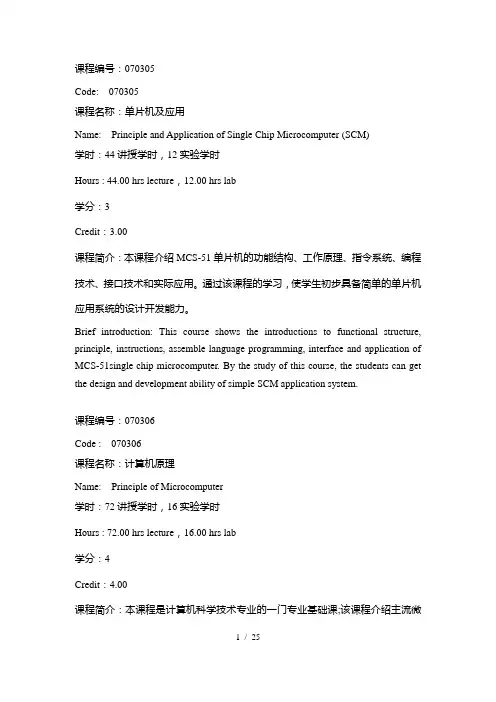
课程编号:070305Code: 070305课程名称:单片机及应用Name: Principle and Application of Single Chip Microcomputer (SCM)学时:44讲授学时,12实验学时Hours : 44.00 hrs lecture,12.00 hrs lab学分:3Credit:3.00课程简介:本课程介绍MCS-51单片机的功能结构、工作原理、指令系统、编程技术、接口技术和实际应用。
通过该课程的学习,使学生初步具备简单的单片机应用系统的设计开发能力。
Brief introduction: This course shows the introductions to functional structure, principle, instructions, assemble language programming, interface and application of MCS-51single chip microcomputer. By the study of this course, the students can get the design and development ability of simple SCM application system.课程编号:070306Code : 070306课程名称:计算机原理Name: Principle of Microcomputer学时:72讲授学时,16实验学时Hours : 72.00 hrs lecture,16.00 hrs lab学分:4Credit:4.00课程简介:本课程是计算机科学技术专业的一门专业基础课;该课程介绍主流微机的结构、指令及汇编语言程序设计和常用的接口电路。
Brief introduction: Principle of Microcomputer is a basic course of Computer Science and Technology; The course introduces the structure of the mainstream computer, instructions and assembly language programming and common interface circuit.课程编号:070307Code : 070307课程名称:接口技术Name: Microcomputer Interface Technology学时:28讲授学时,12实验学时Hours : 28.00 hrs lecture,12.00 hrs lab学分:2Credit:2.00课程简介:本课程是计算机应用专业的必修课;该课程介绍微机的总线及接口技术。
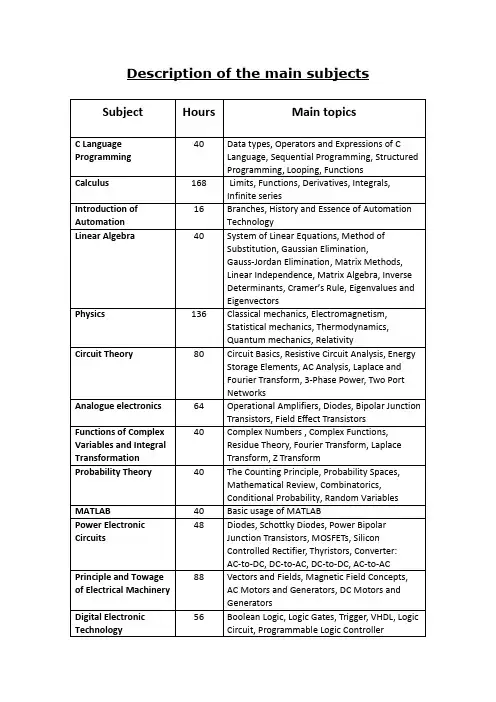
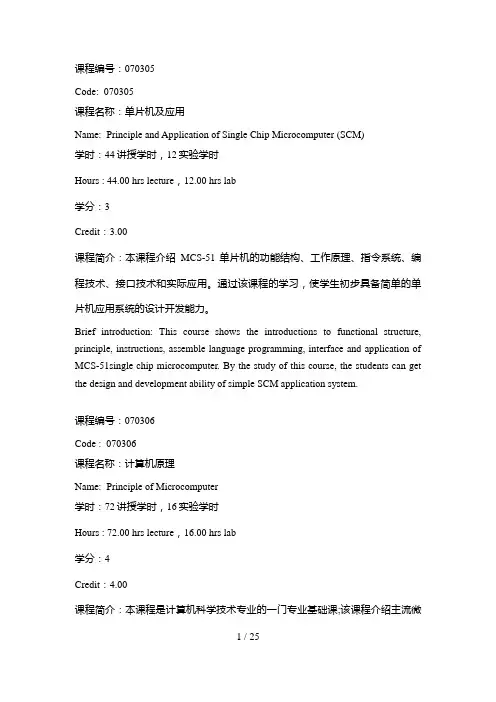
课程编号:070305Code: 070305课程名称:单片机及应用Name: Principle and Application of Single Chip Microcomputer (SCM)学时:44讲授学时,12实验学时Hours : 44.00 hrs lecture,12.00 hrs lab学分:3Credit:3.00课程简介:本课程介绍MCS-51单片机的功能结构、工作原理、指令系统、编程技术、接口技术和实际应用。
通过该课程的学习,使学生初步具备简单的单片机应用系统的设计开发能力。
Brief introduction: This course shows the introductions to functional structure, principle, instructions, assemble language programming, interface and application of MCS-51single chip microcomputer. By the study of this course, the students can get the design and development ability of simple SCM application system.课程编号:070306Code : 070306课程名称:计算机原理Name: Principle of Microcomputer学时:72讲授学时,16实验学时Hours : 72.00 hrs lecture,16.00 hrs lab学分:4Credit:4.00课程简介:本课程是计算机科学技术专业的一门专业基础课;该课程介绍主流微机的结构、指令及汇编语言程序设计和常用的接口电路。
Brief introduction: Principle of Microcomputer is a basic course of Computer Science and Technology; The course introduces the structure of the mainstream computer, instructions and assembly language programming and common interface circuit.课程编号:070307Code : 070307课程名称:接口技术Name: Microcomputer Interface Technology学时:28讲授学时,12实验学时Hours : 28.00 hrs lecture,12.00 hrs lab学分:2Credit:2.00课程简介:本课程是计算机应用专业的必修课;该课程介绍微机的总线及接口技术。

自动化课程简介中英文自动化课程简介简介:自动化课程是一门综合性的学科,旨在培养学生对自动化技术的理解和应用能力。
本课程涵盖了自动控制、传感器技术、机器人技术、工业自动化等多个方面的知识,旨在帮助学生掌握自动化系统的设计、调试和维护技能,以及解决自动化系统中的问题。
课程目标:本课程的主要目标是使学生掌握自动化系统的基本原理和技术,并能够应用这些知识解决实际问题。
具体目标包括:1. 理解自动化系统的基本概念和原理;2. 掌握自动控制系统的设计和调试方法;3. 熟悉常用的传感器技术和应用;4. 理解机器人技术的基本原理和应用;5. 掌握工业自动化系统的设计和维护方法;6. 培养学生的创新思维和解决问题的能力。
课程内容:本课程的内容包括以下几个方面:1. 自动化系统基础知识:介绍自动化系统的基本概念、分类和组成部分,以及自动化系统的发展历程;2. 自动控制系统:介绍自动控制系统的基本原理、控制器的设计和调试方法,以及常见的控制算法;3. 传感器技术:介绍传感器的基本原理、分类和应用,以及传感器的选型和校准方法;4. 机器人技术:介绍机器人的基本原理、结构和应用,以及机器人的编程和控制方法;5. 工业自动化系统:介绍工业自动化系统的组成部分、设计和维护方法,以及工业自动化系统的应用案例;6. 实践项目:通过实践项目,学生将学到的知识应用到实际问题中,培养解决问题的能力和团队合作精神。
教学方法:本课程采用多种教学方法,包括理论讲授、案例分析、实验演示和实践项目等。
通过理论讲授,学生可以了解自动化系统的基本原理和技术;通过案例分析,学生可以学习自动化系统在实际问题中的应用;通过实验演示,学生可以亲自操作和调试自动化系统;通过实践项目,学生可以将所学知识应用到实际问题中,培养解决问题的能力和团队合作精神。
评估方式:本课程的评估方式包括考试、实验报告和实践项目评估。
考试主要测试学生对自动化系统基本原理和技术的理解和掌握程度;实验报告评估学生对自动化系统的设计和调试能力;实践项目评估学生解决实际问题的能力和团队合作精神。
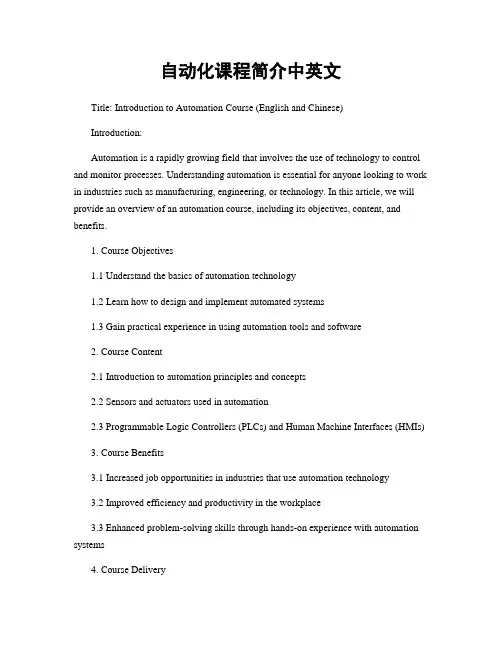
自动化课程简介中英文Title: Introduction to Automation Course (English and Chinese)Introduction:Automation is a rapidly growing field that involves the use of technology to control and monitor processes. Understanding automation is essential for anyone looking to work in industries such as manufacturing, engineering, or technology. In this article, we will provide an overview of an automation course, including its objectives, content, and benefits.1. Course Objectives1.1 Understand the basics of automation technology1.2 Learn how to design and implement automated systems1.3 Gain practical experience in using automation tools and software2. Course Content2.1 Introduction to automation principles and concepts2.2 Sensors and actuators used in automation2.3 Programmable Logic Controllers (PLCs) and Human Machine Interfaces (HMIs)3. Course Benefits3.1 Increased job opportunities in industries that use automation technology3.2 Improved efficiency and productivity in the workplace3.3 Enhanced problem-solving skills through hands-on experience with automation systems4. Course Delivery4.1 Lectures and demonstrations by industry experts4.2 Hands-on practical sessions in a lab setting4.3 Group projects to apply knowledge gained in the course5. ConclusionIn conclusion, an automation course provides students with the knowledge and skills needed to succeed in today's technology-driven world. By understanding automation principles and gaining practical experience, students will be well-equipped to pursue careers in industries that rely on automation technology. Whether you are a beginner or an experienced professional, taking an automation course can help you stay competitive in the job market.自动化课程简介引言:自动化是一个快速发展的领域,涉及使用技术来控制和监控过程。
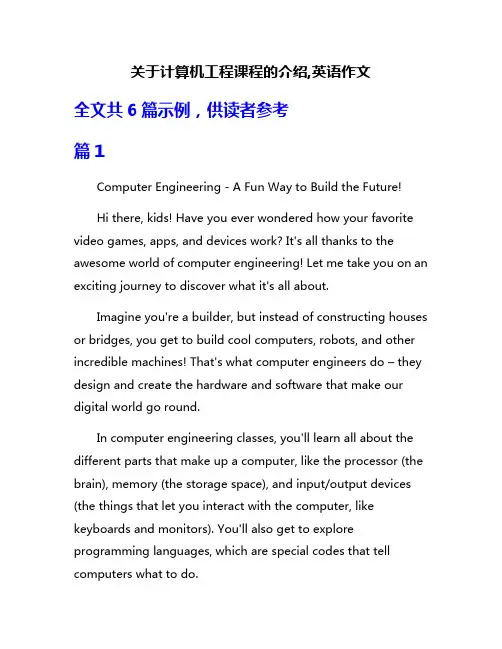
关于计算机工程课程的介绍,英语作文全文共6篇示例,供读者参考篇1Computer Engineering - A Fun Way to Build the Future!Hi there, kids! Have you ever wondered how your favorite video games, apps, and devices work? It's all thanks to the awesome world of computer engineering! Let me take you on an exciting journey to discover what it's all about.Imagine you're a builder, but instead of constructing houses or bridges, you get to build cool computers, robots, and other incredible machines! That's what computer engineers do – they design and create the hardware and software that make our digital world go round.In computer engineering classes, you'll learn all about the different parts that make up a computer, like the processor (the brain), memory (the storage space), and input/output devices (the things that let you interact with the computer, like keyboards and monitors). You'll also get to explore programming languages, which are special codes that tell computers what to do.One of the most fun parts of computer engineering is designing and building circuits. Circuits are like tiny cities with lots of little electronic components (like resistors, capacitors, and transistors) that work together to perform tasks. You'll get to put these components together and watch them come to life! It's like being a master builder with really small bricks.But computer engineering isn't just about hardware – it's also about software. You'll learn how to write code and create programs that can do all sorts of cool things. Want to make a game where you have to catch falling bananas? Or maybe you'd like to build an app that helps you find the best ice cream shops in town? With computer engineering skills, you can make your wildest ideas come true!Another exciting part of computer engineering is robotics. You'll get to design and program robots that can move, sense their surroundings, and even interact with humans! Imagine having your own personal robot assistant that can help you with your homework or remind you to brush your teeth. How cool would that be?Computer engineering isn't just about computers and robots, though. It's also about solving problems and making the world a better place. With the skills you'll learn, you could helpdesign new medical devices that save lives, create apps that help people with disabilities, or develop technologies that protect the environment.Now, you might be thinking, "But computer engineering sounds really hard!" Don't worry – it's all about taking small steps and having fun along the way. Your teachers will guide you through each concept, and you'll get to work on lots of hands-on projects that make learning exciting.And the best part? Computer engineering is a field that's always evolving. New technologies are being developed all the time, which means there's always something new to learn and explore. It's like being a explorer in a digital world that never stops growing and changing!So, what do you say? Are you ready to embark on the adventure of computer engineering? Who knows – you might be the one who designs the next big thing that changes the world! Just remember to have fun, stay curious, and never stop exploring the incredible possibilities of technology.Happy coding, building, and creating!篇2Hello, my friends! Today, I'm going to tell you all about a really cool course called "Computer Engineering." Now, I know what you're thinking, "Ugh, another boring class about computers and numbers." But trust me, this one is different and super exciting!Imagine being able to create your very own video games or apps for your tablet or phone. Or maybe you want to build robots that can help people with their chores or even explore other planets! That's what computer engineering is all about –using computers and technology to make awesome things happen.In this class, you'll learn all about the different parts that make up a computer, like the motherboard, which is like the brain of the computer, and the processor, which is like the muscles that help it think and move really fast. You'll also get to learn about coding, which is like speaking a secret language that computers understand.One of the coolest things about coding is that you can use it to create all sorts of amazing programs and games. It's like having a magic wand that can make anything you can imagine come to life on the screen. And the best part? You get to be the one in control, telling the computer exactly what to do!But it's not just about coding and programming. Computer engineering also involves learning about electronics and circuits. You'll get to play with tiny little components called resistors, capacitors, and transistors, which are like the building blocks of all the cool gadgets we use every day, like phones, tablets, and even robots!Can you imagine being able to build your own little robot that can follow your commands or even dance to your favorite music? That's the kind of stuff you'll be able to do in this class.And if that's not enough to get you excited, you'll also learn about software and how to create apps and programs that can run on different devices, like computers, phones, and even video game consoles. Imagine being able to create the next big hit game that all your friends are playing!But don't worry, it's not all just sitting in front of a computer screen all day. There will be plenty of hands-on activities and projects where you'll get to put your newfound knowledge to the test. You might even get to work in teams and collaborate with your classmates to build something really cool and impressive.And who knows, maybe one day you'll become the next big tech genius, creating amazing inventions that change the world. Or maybe you'll just use your skills to make really awesomegames and apps that everyone loves. Either way, computer engineering is sure to be a blast!So, what do you say? Are you ready to dive into the world of computers, coding, and electronics? Trust me, it's going to be an adventure you'll never forget!篇3Computers are Awesome! An Introduction to Computer EngineeringHi there! My name is Timmy, and I'm here to tell you all about the super cool world of computer engineering! Now, I know what you might be thinking - "Computers are just those boring machines adults use for work and stuff." But trust me, there's way more to it than that!Imagine being able to create your own video games, design websites that people from all over the world can visit, or even program robots to do whatever you want them to do! That's just a tiny glimpse of what computer engineering is all about. It's like being a magician, but instead of pulling rabbits out of hats, you get to work with some of the most advanced technology on the planet.So, what exactly is computer engineering? Well, it's a field that combines elements of computer science and electrical engineering. In other words, you get to learn about the hardware (the physical parts of a computer) and the software (the programs and codes that make the hardware work).Now, let's talk about some of the cool classes you might take if you decide to study computer engineering:Computer Architecture: This class is all about understanding how computers are designed and how they work under the hood. You'll learn about things like processors, memory, and data storage, which are the building blocks of every computer system. It's like taking apart a giant machine and figuring out how all the pieces fit together!Digital Logic Design: In this class, you'll learn how to design and build digital circuits, which are the foundation of all computer systems. You'll get to work with things like logic gates, flip-flops, and counters, which might sound like gibberish now, but trust me, they're super cool once you understand what they do!Programming Languages: This is where the real magic happens! You'll learn how to write code in different programming languages like C++, Java, or Python. With theselanguages, you can create anything from simple calculators to complex video games. It's like learning a secret code that allows you to command computers to do whatever you want!Computer Networks: Have you ever wondered how your computer can talk to other computers all around the world? That's what computer networks are all about! In this class, you'll learn about things like protocols, routers, and servers – the backbone of the internet and other communication networks.Embedded Systems: This class is all about designing and programming tiny computers that are embedded into everyday devices like smartphones, cameras, and even cars! You'll learn how to make these little machines do all sorts of cool things, like take pictures, play music, or even drive themselves (well, maybe not that last one just yet).And those are just a few examples! There are so many other fascinating classes and topics you'll get to explore as a computer engineering student.But it's not just about sitting in a classroom and taking notes (although you'll have to do that too). You'll also get to work on lots of hands-on projects and experiments, where you'll get to put your knowledge into practice and create some seriously awesome stuff.Imagine building your own robot that can navigate through a maze, or designing a video game that your friends can actually play! The possibilities are endless, and the best part is that you'll be learning by doing, which is way more fun than just reading from a textbook.Now, I know what you're thinking: "All of this sounds really cool, Timmy, but isn't it super hard and complicated?" Andyou're right, computer engineering can be challenging at times. But that's what makes it so rewarding! You'll get to exercise your problem-solving skills, creativity, and critical thinking, all while working with some of the coolest technology on the planet.Plus, you'll be part of a community of like-minded people who share your passion for computers and technology. You'll get to collaborate with your classmates on group projects, attend computer club meetings, and maybe even participate in coding competitions or hackathons (don't worry, no actual hacking is involved – it's just a fun name!).And let's not forget about the career opportunities! With a degree in computer engineering, you could end up working for some of the biggest tech companies in the world, like Google, Apple, or Microsoft. Or you could start your own company and create the next big thing in technology! The possibilities areendless, and the demand for skilled computer engineers is only going to keep growing.So, what do you say? Are you ready to join the exciting world of computer engineering and become a tech wizard? Trust me, it's going to be an adventure you'll never forget!篇4Hey there, my friends! Today, I'm going to tell you all about computer engineering courses. It's a really cool and exciting field, and I can't wait to share what I've learned with you!First, let me explain what computer engineering is all about. You see, computer engineers are like wizards who work their magic with computers and technology. They design and create the amazing computers, smartphones, and gadgets that we use every day. Isn't that awesome?Now, let's talk about the courses you can take to become a computer engineer. Imagine a world full of fascinating subjects, where you get to learn all sorts of incredible things!One of the first courses you'll take is called "Introduction to Computer Engineering." In this class, you'll learn about the different parts that make up a computer, like the processor,memory, and motherboard. It's like learning the secret ingredients that go into making a magical potion!Next up is "Digital Logic Design." This course teaches you how computers think and process information using ones and zeros. It's like learning a secret language that only computers can understand! You'll get to play with cool tools and build your very own digital circuits.Then, there's "Computer Architecture," where you'll dive into the inner workings of computers and learn how all the different components work together. It's like unraveling the mysteries of a complex machine and figuring out how to make it run smoothly.But wait, there's more! You'll also get to take courses on "Programming Languages" and "Software Engineering." These classes will teach you how to write the instructions that tell computers what to do. It's like learning to speak the language of machines and giving them commands to perform amazing tasks.Imagine being able to create your own video games, apps, or even robots! With the knowledge you gain from these courses, the possibilities are endless.There's also "Computer Networks" and "Data Communications," where you'll learn how computers talk to eachother and share information. It's like learning the secret codes that allow devices to communicate and connect with each other across the world!And if that's not enough, you'll get to explore "Embedded Systems" and "Internet of Things." These courses teach you how to make everyday objects, like toys, appliances, and even cars, smarter and more connected. It's like bringing the magic of technology into the real world!But don't worry; it's not all just sitting in a classroom and listening to lectures. In many of these courses, you'll get to work on exciting projects and build cool things with your own hands. You might even get to work in teams and collaborate with your friends, just like real computer engineers do!So, what do you think? Doesn't computer engineering sound like an amazing adventure? With all these incredible courses, you'll be well on your way to becoming a technological wizard, creating amazing things and shaping the future of technology.Just remember, even though it might seem challenging at times, keep practicing, keep learning, and most importantly, have fun! Computer engineering is all about using your creativity and imagination to solve problems and make the world a better place.Who knows, maybe one day, you'll design the next big thing that changes the world! So, are you ready to embark on this exciting journey and become a computer engineering superhero? Let's do this!篇5The Awesome World of Computer EngineeringHey kids! Have you ever wondered how computers work? Or how video games and apps are made? Well, that's what computer engineering is all about! It's like a magical world where people create awesome stuff using computers and technology.In computer engineering classes, you'll learn all about the different parts of a computer and how they work together. It's like a big puzzle, and you get to figure out how to put all the pieces together! You'll learn about the CPU, which is like the brain of the computer, and the RAM, which is like its memory. You'll also learn about storage devices like hard drives and SSDs, which are like the computer's file cabinets where it keeps all its important stuff.But computer engineering isn't just about hardware (that's the physical parts of a computer). You'll also learn about software, which is like the instructions that tell the computerwhat to do. There are different programming languages, like Java, Python, and C++, which are like special codes that you use to write these instructions. It's kind of like learning a new language, but instead of talking to people, you're talking to computers!One of the coolest things you'll learn about in computer engineering is how to make games and apps. Imagine being able to create your own video game or a cool new app for your phone or tablet! You'll learn how to design the graphics, create the characters, and program all the different features and levels. It's like being a superhero and having the power to bring your ideas to life!You'll also learn about computer networks and how computers can communicate with each other. This is how the internet works, and it's like a giant web that connects all the computers in the world. You'll learn about things like servers, routers, and protocols, which are like the rules and roads that help information travel smoothly across the network.Another exciting part of computer engineering is robotics. You'll learn how to program and control robots, which are like cool machines that can do all sorts of amazing things. You can make robots that can move around, pick up objects, or evensolve puzzles and problems. It's like having your own personal robot assistant!But computer engineering isn't just about coding and machines. You'll also learn about important things like cybersecurity, which is all about keeping computers and information safe from hackers and viruses. It's like being a superhero and protecting the digital world from evil villains!Overall, computer engineering is an awesome field that combines science, technology, and creativity. If you love solving puzzles, building things, and using your imagination, then computer engineering might be the perfect fit for you. Who knows, maybe one day you'll create the next big video game, app, or even a revolutionary new technology that changes the world!So, what do you think? Are you ready to embark on an adventure in the world of computer engineering? It's a journey filled with endless possibilities and excitement, and it all starts with your curiosity and passion for technology. Let's get coding!篇6Let's Explore the Amazing World of Computer Engineering!Hello, my fellow curious minds! Have you ever wondered how computers work? How do they play games, show movies, or help us learn new things? Well, today we are going to dive into the exciting world of computer engineering and uncover the secrets behind these incredible machines!Computer engineering is all about creating and designing computer systems. It's like being a builder, but instead of bricks and cement, we use circuits and codes. Isn't that fascinating? In computer engineering classes, we learn how to build and program computers, robots, and all kinds of cool gadgets. Let's take a closer look at what we can discover in this amazing course.1. Introduction to ComputersIn our first lessons, we learn all about the different parts of a computer. We get to explore the CPU (Central Processing Unit), which is like the brain of the computer, and the memory, which helps the computer remember things. We also learn about input and output devices, like keyboards, mice, and monitors. It's like learning about the organs and senses of a computer!2. Coding AdventuresNow, this is where the real magic happens! We get to learn how to write code and create our own programs. It's like learninga special language that only computers understand. We start with simple codes, like making a computer draw shapes or play music. As we become more experienced, we can create games, design websites, and even make our own apps! The possibilities are endless when it comes to coding.3. Robotics and AutomationRobots are super cool, right? In computer engineering classes, we get to build and program robots too! We learn how to make them move, sense their environment, and even make them dance. It's like bringing our wildest dreams to life. We also explore how robots are used in real-life situations, like helping doctors in surgeries or exploring distant planets. Who knows, maybe one day you'll build a robot that can do your chores!4. Internet and NetworkingHave you ever wondered how the internet works? In computer engineering, we get to learn about networks and how computers communicate with each other. We explore the world of websites, emails, and online games. We also learn about internet safety and how to protect ourselves from online dangers. Knowledge is power, my friends!5. Problem SolvingComputer engineering is not just about building and programming. It's also about solving problems and thinking creatively. We learn how to analyze problems, break them down into smaller parts, and find the best solutions. Theseproblem-solving skills are not only useful in computer engineering but in many other areas of life too. It's like training our brains to become super detectives!ConclusionWow! Wasn't that an incredible journey into the world of computer engineering? We explored the ins and outs of computers, learned how to code, built robots, and discovered the wonders of the internet. Computer engineering is like a never-ending adventure, with new discoveries waiting for us at every turn.So, my young friends, if you're curious about computers and love to explore, computer engineering might just be the perfect course for you. Who knows, maybe one day you'll create the next big invention or solve a problem that will change the world. The possibilities are endless, and the future is yours to explore!Keep dreaming, keep exploring, and remember, the world needs young minds like yours to shape the future of technology. Happy coding!。

自动化课程简介中英文自动化课程简介简介:自动化课程是一门涵盖自动控制系统、机器人技术和人工智能等领域知识的综合性课程。
本课程旨在培养学生对自动化技术的理论基础和实际应用的深入理解,以及培养学生的创新能力和实践能力。
课程内容包括自动控制系统的基本原理、传感器与执行器、控制算法、机器人技术、人工智能在自动化中的应用等。
课程目标:1. 理解自动化技术的基本原理和概念。
2. 掌握自动控制系统的设计与调试方法。
3. 熟悉传感器与执行器的原理和应用。
4. 理解控制算法的原理和实现方法。
5. 了解机器人技术的基本原理和应用场景。
6. 掌握人工智能在自动化中的应用方法。
课程大纲:一、自动化技术概述1. 自动化技术的定义和发展历程2. 自动化技术在工业和生活中的应用3. 自动化系统的组成和特点二、自动控制系统1. 控制系统的基本概念和分类2. 闭环控制与开环控制3. 控制系统的数学建模4. 控制系统的稳定性分析与设计方法三、传感器与执行器1. 传感器的原理和分类2. 常用传感器的特点和应用3. 执行器的原理和分类4. 常用执行器的特点和应用四、控制算法1. PID控制算法的原理和调试方法2. 其他常用控制算法的原理和应用3. 系统辨识方法与参数调整技术五、机器人技术1. 机器人的基本概念和分类2. 机器人的运动学和动力学3. 机器人的路径规划和运动控制4. 机器人在工业和服务领域的应用六、人工智能在自动化中的应用1. 人工智能的基本概念和技术2. 机器学习在自动化中的应用3. 深度学习在自动化中的应用4. 自动化系统的智能化设计与优化教学方法:本课程采用理论教学与实践相结合的教学方法。
理论教学主要通过课堂讲解、案例分析和课程作业等方式进行;实践教学主要通过实验、实训和项目实践等方式进行。
学生将通过实际操作和实践项目,深入理解自动化技术的应用和实现方法。
考核方式:本课程的考核方式包括平时成绩和期末考试。
平时成绩主要包括课堂表现、作业完成情况和实验报告等;期末考试主要考察学生对课程知识的掌握程度和综合应用能力。

自动化课程简介中英文自动化课程简介简介:自动化课程是一门涉及自动控制系统、传感器技术、运动控制、机器视觉等内容的学科。
本课程旨在培养学生对自动化技术的理解和应用能力,使他们能够在工业生产、创造业、机器人技术等领域中发挥重要作用。
课程目标:1. 理解自动化技术的基本原理和概念。
2. 掌握自动化系统的设计和实施方法。
3. 学习传感器技术和运动控制的基本知识。
4. 熟悉机器视觉和图象处理的应用。
5. 培养解决自动化问题的能力和创新思维。
课程大纲:第一单元:自动化基础- 自动化概述- 自动控制系统- 控制理论基础- 反馈控制系统- 开环控制系统第二单元:传感器技术- 传感器的作用和分类- 传感器的原理和特性- 常用传感器的应用- 传感器信号处理第三单元:运动控制- 运动控制系统的组成- 伺服控制系统- 步进机电控制- 运动控制器的选择和应用第四单元:机器视觉- 机器视觉的基本原理- 图象采集和处理- 特征提取和模式识别- 机器视觉在工业自动化中的应用课程教学方法:1. 理论授课:通过讲解自动化技术的基本概念、原理和应用,匡助学生建立起系统的知识框架。
2. 实验实践:通过实验操作,让学生亲自操控自动化设备,加深对自动化技术的理解和掌握。
3. 项目实践:组织学生参预自动化项目实践,培养他们解决问题的能力和团队合作精神。
考核方式:1. 课堂参预:学生积极参预课堂讨论和实验操作,表现出良好的学习态度和团队合作能力。
2. 作业和实验报告:学生按时完成课程作业和实验报告,展示对自动化技术的理解和应用能力。
3. 期末考试:对学生对自动化课程所学知识的掌握情况进行综合考核。
参考教材:1.《自动化技术导论》- 王晓峰2.《传感器技术与应用》- 张明3.《运动控制系统设计与应用》- 李华4.《机器视觉技术与应用》- 陈志刚课程收益:1. 学习自动化技术的基本原理和应用,为将来从事相关行业打下坚实基础。
2. 培养解决自动化问题的能力和创新思维,提高工程实践能力。
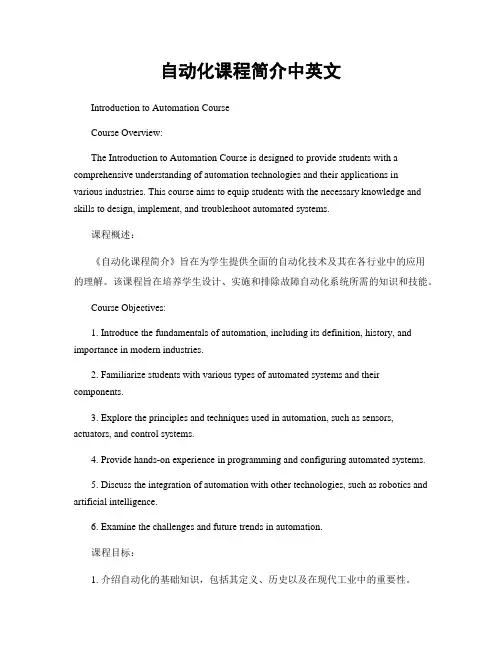
自动化课程简介中英文Introduction to Automation CourseCourse Overview:The Introduction to Automation Course is designed to provide students with a comprehensive understanding of automation technologies and their applications in various industries. This course aims to equip students with the necessary knowledge and skills to design, implement, and troubleshoot automated systems.课程概述:《自动化课程简介》旨在为学生提供全面的自动化技术及其在各行业中的应用的理解。
该课程旨在培养学生设计、实施和排除故障自动化系统所需的知识和技能。
Course Objectives:1. Introduce the fundamentals of automation, including its definition, history, and importance in modern industries.2. Familiarize students with various types of automated systems and their components.3. Explore the principles and techniques used in automation, such as sensors, actuators, and control systems.4. Provide hands-on experience in programming and configuring automated systems.5. Discuss the integration of automation with other technologies, such as robotics and artificial intelligence.6. Examine the challenges and future trends in automation.课程目标:1. 介绍自动化的基础知识,包括其定义、历史以及在现代工业中的重要性。
XX大学课程描述Course DescriptionNanjing University学生XX:Name:学号:0000000000000Student ID.:专业:计算机科学与技术(计算机科学与技术方向)Specialty: puter Science and Technology学期 1-1Term 1-1思想和中国特色社会主义理论体系概论:Mao Zedong Thoughts and the Chinese Characteristic Socialism Theory System Introduction学分6.0Credit: 6.0学时: 48Hours: 48课程内容:是一门思想政治理论课,其主要任务是帮助学生学习思想和中国特色社会主义理论体系的基本内容,帮助学生理解思想和中国特色社会主义理论体系是马克思主义的基本原理与中国实际相结合的两次伟大的理论成果。
内容包括:马克思主义中国化的历史进程和理论成果、马克思主义中国化理论成果的精髓、新XX主义革命理论、社会主义改造理论、社会主义的本质和根本任务、社会主义初级阶段理论等等。
Content: This is an ideological and political course which helps students to learn the basic contents of MAO Zedong Thoughts and the Chinese Characteristic Socialism Theory System, and understand that is great theoretical achievements in the integration of basic principle of Marxism and Chinese reality. This course introduces historical progressing, theoretical achievement and essentials of Sinicization of Marxism, new-democratic revolution theory, socialism nature and ultimate goal, as well as theory of the socialism primary stage大学英语(一)College English 1学分:4.0Credit: 4.0学时:64Hours: 64课程内容:该课程以X文为基础,涵盖听,说,读,写四个方面,结合词汇和语法讲解,旨在提高大学生的英语综合能力,以达到英语四级的水平。
自动化课程简介中英文自动化课程简介简介:自动化课程是一门介绍自动化技术和应用的综合性课程。
本课程旨在帮助学生全面了解自动化的基本概念、原理和应用领域。
通过学习本课程,学生将掌握自动化技术的基本原理、常用工具和技术方法,培养自动化系统设计和控制的能力,为未来从事自动化相关领域的工作做好准备。
课程目标:1. 了解自动化的基本概念和原理;2. 熟悉自动化系统的组成和工作原理;3. 掌握自动化系统的设计和调试方法;4. 理解自动化技术在工业、交通、能源等领域的应用;5. 培养自动化系统设计和控制的能力。
课程大纲:第一部分:自动化基础1. 自动化概念和发展历程- 自动化的定义和特点- 自动化技术的发展历程2. 自动化系统的组成和分类- 自动化系统的基本组成- 自动化系统的分类及应用领域3. 传感器与执行器- 传感器的原理和种类- 执行器的原理和种类4. 控制系统基础- 反馈控制原理- 控制系统的稳定性分析第二部分:自动化工程1. 自动化系统设计- 自动化系统设计的流程- 自动化系统设计的方法和工具2. 自动化系统调试与优化- 自动化系统调试的基本步骤- 自动化系统性能优化的方法3. 自动化系统的通信与网络- 自动化系统的通信协议和网络结构 - 自动化系统的网络安全与管理第三部分:自动化应用1. 工业自动化- 工业自动化的基本概念和特点- 工业自动化的应用案例2. 交通自动化- 交通信号控制系统- 智能交通系统3. 能源自动化- 电力系统自动化- 新能源系统自动化4. 智能家居与物联网- 智能家居系统的设计与实现- 物联网在智能家居中的应用教学方法:本课程采用理论教学与实践相结合的教学方法,注重培养学生的实际操作能力和问题解决能力。
课程设置理论讲授、实验操作、案例分析等环节,通过理论与实践的结合,使学生能够更好地理解和应用所学知识。
评估方式:课程评估主要包括平时成绩和期末考试成绩。
平时成绩占总评成绩的30%,包括课堂表现、作业和实验报告等。
自动化课程简介中英文自动化课程简介IntroductionAutomation is a rapidly growing field that involves the use of technology and machines to perform tasks with minimal human intervention. As the demand for automation continues to rise, it is becoming increasingly important for individuals to acquire the necessary skills and knowledge in this field. In this article, we will provide a comprehensive introduction to the subject of automation, covering its definition, applications, benefits, and future prospects.Body1. Definition of Automation1.1 Definition of automation: Automation refers to the use of technology and machines to perform tasks that were previously done by humans. It involves the use of various tools, such as sensors, controllers, and software, to control and monitor the operation of machines and systems.1.2 Types of automation: There are different types of automation, including industrial automation, home automation, and process automation. Industrial automation involves the use of machines and robots to perform tasks in manufacturing and production processes. Home automation, on the other hand, focuses on the automation of household tasks and appliances. Process automation involves the automation of repetitive tasks and workflows in various industries.1.3 Importance of automation: Automation plays a crucial role in increasing productivity, improving efficiency, and reducing human error. It allows tasks to be performed more quickly, consistently, and accurately, leading to cost savings and improved quality.2. Applications of Automation2.1 Manufacturing and Production: Automation has revolutionized the manufacturing industry by streamlining production processes, increasing output, and improving product quality. Robots and machines are used to perform tasks such as assembly, packaging, and quality control.2.2 Healthcare: Automation has also found applications in the healthcare industry. It is used in medical imaging, laboratory testing, and drug discovery processes. Automation improves accuracy, reduces the risk of human error, and enhances patient care.2.3 Transportation: Automation has the potential to transform the transportation industry. Self-driving cars, automated warehouses, and drone delivery systems are just a few examples of how automation is changing the way we transport goods and people.2.4 Energy and Utilities: Automation is widely used in the energy and utilities sector to monitor and control power plants, water treatment facilities, and distribution systems. It helps optimize energy consumption, reduce waste, and improve overall efficiency.2.5 Agriculture: Automation has the potential to revolutionize the agriculture industry by enabling precision farming techniques. Automated systems can monitor soil conditions, water levels, and crop health, leading to increased productivity and reduced environmental impact.3. Benefits of Automation3.1 Increased productivity: Automation allows tasks to be performed at a faster rate, leading to increased productivity and output. It eliminates the need for repetitive manual labor and frees up human resources for more complex and creative tasks.3.2 Improved efficiency: Automation reduces the time and effort required to perform tasks, resulting in improved efficiency. It eliminates human error and ensures consistent and accurate results.3.3 Cost savings: Automation can lead to significant cost savings by reducing labor costs, minimizing waste, and optimizing resource utilization. It also helps in reducing the risk of accidents and injuries, resulting in lower insurance and healthcare costs.4. Future Prospects of Automation4.1 Artificial Intelligence and Machine Learning: The integration of artificial intelligence and machine learning technologies with automation is expected to revolutionize various industries. Intelligent automation systems will be able to learn and adapt to changing conditions, making them more efficient and effective.4.2 Internet of Things (IoT): The IoT will enable the seamless integration of various devices and systems, allowing for real-time data exchange and decision-making. This will further enhance the capabilities of automation systems and enable new applications.4.3 Ethical and Social Implications: As automation continues to advance, it raises ethical and social concerns. Issues such as job displacement, privacy, and security need to be addressed to ensure that the benefits of automation are shared equitably and responsibly.ConclusionAutomation is a rapidly evolving field with numerous applications and benefits. It has the potential to transform industries, increase productivity, and improve efficiency. However, it also presents challenges that need to be addressed. As automation continues to advance, it is crucial for individuals to acquire the necessary skills and knowledge to adapt to this changing landscape.。
自动化课程简介中英文Title: Introduction to Automation Course (English and Chinese)Introduction:Automation is a key component of modern technology and plays a crucial role in various industries. In this article, we will provide an overview of an automation course, highlighting its importance and key concepts.1. Importance of Automation Course:1.1. Automation is essential for increasing efficiency and reducing human error in various processes.1.2. Automation helps businesses save time and resources by automating repetitive tasks.1.3. Automation skills are in high demand in the job market, making it a valuable asset for professionals.2. Key Concepts of Automation Course:2.1. Introduction to automation tools and technologies, such as robotic process automation (RPA) and artificial intelligence (AI).2.2. Hands-on experience with automation software and programming languages, such as Python and Java.2.3. Understanding of automation best practices and strategies for implementing automation solutions in real-world scenarios.3. Course Curriculum:3.1. Overview of automation principles and concepts.3.2. Introduction to automation tools and technologies.3.3. Hands-on labs and projects to apply automation skills in practical scenarios.4. Benefits of Taking an Automation Course:4.1. Enhanced job prospects and career opportunities in automation-related fields.4.2. Improved efficiency and productivity in the workplace through automation skills.4.3. Opportunities for continuous learning and professional development in the fast-evolving field of automation.5. Conclusion:In conclusion, an automation course provides valuable knowledge and skills for individuals looking to excel in the field of automation. By understanding the importance of automation, mastering key concepts, and gaining practical experience, students can enhance their career prospects and contribute to the advancement of technology in various industries.自动化课程简介中英文引言:自动化是现代技术的关键组成部份,在各行各业中起着至关重要的作用。
自动化课程简介中英文Title: Introduction to Automation Course (English and Chinese)Introduction:Automation has become an essential part of various industries, revolutionizing the way tasks are performed and increasing efficiency. This article will provide an overview of the key concepts covered in an automation course, both in English and Chinese.1. Basic Concepts1.1 Definition: Automation refers to the use of technology to perform tasks with minimal human intervention.1.2 Importance: Automation helps streamline processes, reduce errors, and increase productivity.1.3 Examples: Automated manufacturing systems, robotic process automation, and smart home devices.2. Types of Automation2.1 Industrial Automation: Involves the use of machines and control systems to automate manufacturing processes.2.2 Office Automation: Focuses on automating office tasks such as data entry, document management, and communication.2.3 Home Automation: Enables the control of household devices and systems through smart technology.3. Automation Technologies3.1 Robotics: Involves the design and programming of robots to perform tasks in various industries.3.2 Artificial Intelligence: Utilizes machine learning and algorithms to automate decision-making processes.3.3 Internet of Things (IoT): Connects devices and sensors to enable communication and automation of tasks.4. Benefits of Automation4.1 Increased Efficiency: Automation reduces the time and effort required to complete tasks.4.2 Cost Savings: Automation can lower operational costs and improve resource utilization.4.3 Improved Accuracy: Automated systems are less prone to errors compared to manual processes.5. Future Trends in Automation5.1 Autonomous Vehicles: Self-driving cars and drones are examples of automation in transportation.5.2 Industry 4.0: The integration of automation, data exchange, and IoT in manufacturing processes.5.3 Smart Cities: Automation technologies are being used to improve urban infrastructure and services.Conclusion:In conclusion, automation plays a crucial role in shaping the future of various industries and daily life. By understanding the basic concepts, types, technologies, benefits, and future trends of automation, individuals can better prepare for the opportunities and challenges brought by this transformative technology. 自动化已经成为各行各业的一个重要组成部分,彻底改变了任务执行的方式,提高了效率。
自动化课程简介中英文自动化课程简介简介:自动化课程是一门涵盖自动控制、机械工程、电子工程等多个学科领域的综合性课程。
通过该课程的学习,学生将掌握自动化系统的基本原理、设计与应用,并具备解决实际问题的能力。
本文将详细介绍自动化课程的内容、学习目标、教学方法和评估方式。
一、课程内容:1. 自动化基础知识:介绍自动化的概念、发展历程、基本原理和关键技术。
2. 控制系统理论:包括控制系统的建模与分析、传递函数、稳定性分析等内容。
3. 传感器与执行器:介绍常见的传感器和执行器的原理、特点及应用。
4. 自动化系统设计:包括系统需求分析、系统拓扑结构设计、控制策略选择等内容。
5. 自动化应用案例:通过实际案例,展示自动化技术在工业、农业、交通等领域的应用。
二、学习目标:1. 理论知识:了解自动化的基本概念、原理和技术,掌握控制系统的建模与分析方法。
2. 实践能力:具备使用传感器和执行器进行系统设计与调试的能力。
3. 解决问题能力:能够分析和解决自动化系统中的问题,提出改进方案。
4. 团队合作能力:通过小组项目实践,培养学生的团队协作和沟通能力。
三、教学方法:1. 理论讲授:通过课堂讲解,向学生介绍自动化的基本理论知识和技术。
2. 实验实践:设置实验课程,让学生亲自动手操控传感器和执行器,实现自动化控制。
3. 项目实践:组织学生参与自动化项目,培养学生的实际操作和解决问题的能力。
4. 讨论与互动:鼓励学生在课堂上提问、讨论,促进学生之间的交流和思维碰撞。
四、评估方式:1. 平时表现:包括课堂参与、作业完成情况、实验报告等。
2. 期中考试:考察学生对自动化基础知识的掌握程度。
3. 项目评估:评估学生在项目实践中的表现和成果。
4. 期末考试:考察学生对整个课程内容的理解和应用能力。
结语:自动化课程是培养学生工程实践能力和创新思维的重要课程,通过深入学习自动化的基本理论和实践技术,学生将能够在工业自动化、智能制造等领域中发挥重要作用。
课程编号:070305Code: 070305课程名称:单片机及应用Name: Principle and Application of Single Chip Microcomputer (SCM)学时:44讲授学时,12实验学时Hours : 44.00 hrs lecture,12.00 hrs lab学分:3Credit:3.00课程简介:本课程介绍MCS-51单片机的功能结构、工作原理、指令系统、编程技术、接口技术和实际应用。
通过该课程的学习,使学生初步具备简单的单片机应用系统的设计开发能力。
Brief introduction: This course shows the introductions to functional structure, principle, instructions, assemble language programming, interface and application of MCS-51single chip microcomputer. By the study of this course, the students can get the design and development ability of simple SCM application system.课程编号:070306Code : 070306课程名称:计算机原理Name: Principle of Microcomputer学时:72讲授学时,16实验学时Hours : 72.00 hrs lecture,16.00 hrs lab学分:4Credit:4.00课程简介:本课程是计算机科学技术专业的一门专业基础课;该课程介绍主流微机的结构、指令及汇编语言程序设计和常用的接口电路。
Brief introduction: Principle of Microcomputer is a basic course of Computer Science and Technology; The course introduces the structure of the mainstream computer, instructions and assembly language programming and common interface circuit.课程编号:070307Code : 070307课程名称:接口技术Name: Microcomputer Interface Technology学时:28讲授学时,12实验学时Hours : 28.00 hrs lecture,12.00 hrs lab学分:2Credit:2.00课程简介:本课程是计算机应用专业的必修课;该课程介绍微机的总线及接口技术。
通过该课程的学习,使学生能设计较为简单的接口控制线路。
Brief introduction: Microcomputer interface technology is a compulsory course of computer application major. The bus and interface technology are introduced in this course. By the study of this course, the students can obtain the design ability of some simpler interface control system.课程编号:070308Code : 070308课程名称:工程制图Name: Project Drawing学时:48讲授学时,16实验学时Hours : 48.00 hrs lecture,16.00 hrs lab学分:2.5Credit:2.50课程简介:本课程是计算机科学技术专业的一门专业基础课;该课程介绍绘制和阅读工程图样的基本原理和基本方法。
Brief introduction: Principle of Microcomputer is a basic course of Computer Science and Technology; The course introduces the basic principles and methods of drawing and reading engineering drawings..课程编号:070311Code : 070311课程名称:科技英语Name: Scientific English学时:48讲授学时,0实验学时Hours : 48.00 hrs lecture,0.00 hrs lab学分:3Credit:3.00课程简介:本课程是计算机科学与技术方向的专业课;该课程是将计算机组织结构、操作系统、网络等知识在英语的环境下进行讲解分析,其教学目标是增加学生的计算机英语词汇量,提高学生专业方面的英语技能。
Brief introduction: Scientific English is a specialized course of computer science and technology major. In this course, the knowledge is introduced in English, such as principles of computer organization, operating system, computer networks and so on. Teaching aims are to make students learn more English words about computer and enhance the computer English ability of students.课程编号:070331Code : 070331课程名称:信号与系统及其数学基础Name: Signals and Systems学时:64讲授学时,12实验学时Hours : 64.00 hrs lecture,12.00 hrs lab学分:3.5Credit:3.50课程简介:本课程是电子信息、通信工程等专业的一门专业理论基础课;主要内容包括:连续系统的时域分析、离散系统的时域分析、连续系统的频域分析、连续系统的S域分析、离散系统的Z域分析。
Brief introduction: The course is a professional theory basic course of Electronic information and Communication Engineering etc; it mainly involves: Time domain analysis of continuous systems, discrete systems with time-domain analysis, frequency domain analysis of continuous systems, S-domain analysis of continuous systems, Z-domain analysis of discrete systems课程编号:070332Code: 070332课程名称:数据采集系统Name: The Data Acquisition System学时:36讲授学时,12实验学时Hours : 36.00 hrs lecture,12.00 hrs lab学分:2Credit:2.00课程简介:本课程是计算机科学与技术、自动化专业的专业课。
内容主要包括数据采集的基本原理,数据的采集、传输和处理技术,以及常用器件的结构、工作原理、编程方法和电气特性等。
Brief introduction: The data acquisition system is a specialized course of both computer science and technology major and automation major. This course consists of the principle of data acquisition; technology of data transfer and processing; the structure, principle and characteristics of electronic devices etc..课程编号:070333Code : 070333课程名称:PLC应用及开发Name: Application and Development of PLC学时:56讲授学时,16实验学时Hours : 56.00 hrs lecture,16.00 hrs lab学分:3.0Credit:3.00课程简介:本课程是信息与计算科学、自动化等专业的一门专业基础课;主要介绍PLC的软硬件结构和基本工作原理,内容包括:PLC的接线、存储区分配、指令系统、I/O单元、串行通信、程序设计。
Brief introduction: The course is a professional basic course of Information and Computing Science,Automation etc; The course introduces PLC hardware and software structure and the basic working principle,it mainly involves:PLC wiring, memory allocation, instruction, I / O modules, serial communications, program design课程编号:070334Code : 070334课程名称:嵌入式系统开发Name: Embedded Systems学时:20讲授学时,12实验学时Hours :20.00 hrs lecture,12.00 hrs lab学分:1.5Credit:1.50课程简介:本课程主要学习嵌入式系统设计原理及方法,通过本课程的学习,使学生了解嵌入式处理器ARM7的体系结构及指令系统,掌握嵌入式系统的分析与设计方法。
Brief introduction: This course mainly introduces the design principle and methods of embedded systems. By the study of this course, the students can understand the architecture and instruction system of ARM7embedded processor, and get the analysis and design methods of embedded system.课程编号:070402Code : 070402课程名称:C语言程序设计Name: Programming Language C学时:96讲授学时,32实验学时Hours : 96.00 hrs lecture,32.00 hrs lab学分:5.0Credit:5.00课程简介:本课程是信息与计算科学的一门专业基础课;以研究程序结构和编程技术为主要目标,内容包括:算法、基本数据类型、简单程序、选择结构、循环结构、数组、函数、指针、结构体等。